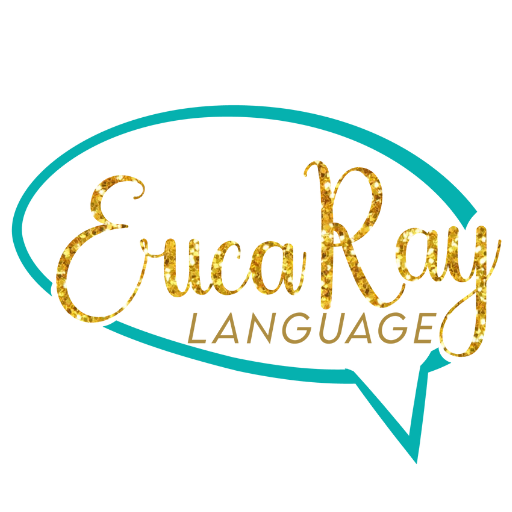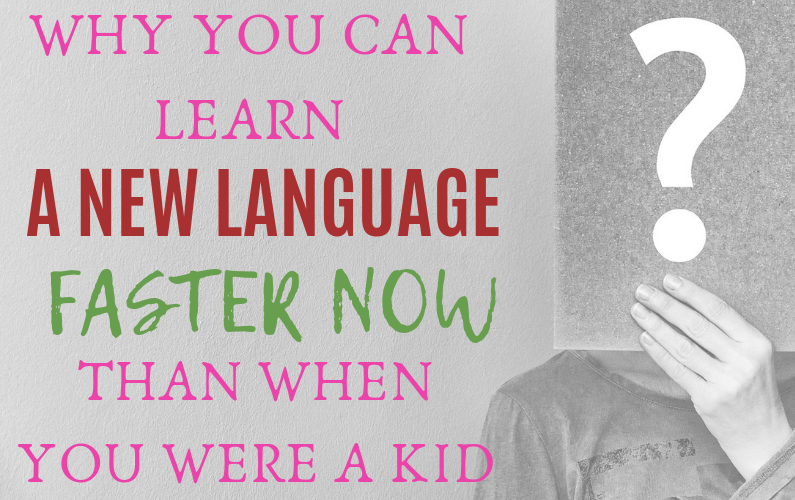We’ve all heard it before. “Kids are masters at learning a new language.” “Past the age of 12 (or 10…or 5!) it’s much harder to develop native-level fluency.” “A baby’s brain can easily pick up 3-5 languages at one time.”
And you’ve wondered, “Is it too late for me?” “Can I really learn a new language and learn to use it well now that I’m an adult?”
Take heart. You may be surprised to learn that adults have some advantages over children when it comes to learning a new language. Here are 4 reasons that your adult self may put your kid self to shame when it comes to language learning.
ADULTS ARE MOTIVATED TO LEARN A NEW LANGUAGE

When you’re a child you eventually learn the language or languages of your environment. Period. You have no conscious reason for doing so. It’s just something that happens. Most of the time we think of that as an advantage that children have over us. But think about it.
As an adult, you have a reason for learning a new language.
Maybe you want to not only travel, but have the ability to have meaningful conversations with the people you meet.
The company that you work for may be moving towards a more international structure and you know that learning a new language would give you an advantage.
You may have found a special someone and you want to be able to communicate on a deeper level with that person.
You may want to set a good example for your children and encourage them to have an interest in language learning.
Perhaps you want to expand your horizons. After all, while monolingualism is viewed as normal in the U.S., most of the world speaks at least 2 languages and has more cultural awareness because of that.
The more powerful your reason, the more powerful the actions you take to get there will be.
ADULTS ARE IN CONTROL OF THEIR LEARNING ENVIRONMENT
A child has no control over his learning environment. Some children have parents who read to them a lot. Some don’t.
Some kids grow up in a bilingual or multilingual household. Some don’t.
Some children have parents that interact with them directly, carry them around in a carrier, and explain everything that is going on around them. “Look! There are crumbs on the floor! Mommy is going to clean up with this. This is a vacuum cleaner. It’s going to make a loud noise like this…VROOOOM!” (baby laughs).
But some children are kind of left to the side to figure things out on their own. Yes, they’ll still learn the language, but research (and common sense) has shown that the greater the interaction with the child, the more advantages that child will have in speaking, comprehension, vocabulary acquisition, and the list goes on and on.
Well, as an adult, YOU, are in control. You can choose to completely immerse yourself in your new language if you so desire. You can actively seek out and put yourself in groups and communities that only speak that language.
You can choose to only watch programs in that language.
You can sign up to take classes in that language.
You can choose to only read books in that language.
You can choose to go all out, move abroad, and immerse yourself in the language that way.
Really, the speed at which you learn a language is largely dependent on your dedication, whereas, for babies, it’s largely dependent on their circumstances.
ADULTS HAVE ALREADY LEARNED LIFE SKILLS

Can you speak? Can you read? Then you already have an advantage over a baby. A baby’s brain is a marvel of wonder, but there are just certain things that we cannot expect from them.
Whereas we can learn enough vocabulary to be conversational in a language in a month, we cannot have a verbal conversation over tea with our 1-month-old. A lot needs to happen before a baby gets to that level.
What about reading? Reading is a whole other cognitive experience for a child. It’s a process. They have to learn that letters on a page are not only drawings, but represent units of sounds and/or meanings, and those units can be strung together to make words or thoughts.
Then they must learn to decode those words (in certain languages), memorize some by sight, practice until fluency is reached. Some learn faster. Some learn slower. But it’s always a process. It’s something that is usually taught to a child for many years in a very intentional way.
Well if you can read, then you already know those things. If you’re learning a language that is phonetic or that shares a similar alphabet as your own, then you can learn to read the new language more quickly than you may imagine.
For example, if you learn today that all vowels in Spanish make just one sound each and that most of the consonants do as well, with a few exceptions, and you learn those sounds today (which is not hard to do), then you can begin reading Spanish today. And your speaking and vocabulary will skyrocket from there.
ADULTS KNOW THAT LANGUAGES HAVE RULES AND PATTERNS
As much as many of us hate learning the textbook grammar of a language, guess what? We actually understand that languages have grammatical rules and patterns that can be learned, understood, and applied.
We also know that rules are made to be broken and that many grammar rules have exceptions to them. These things might be difficult to apply, but at least we know that they exist. We can learn about them and actively think about them.
Children don’t get that stuff yet. Their grammar smooths out eventually. But think about how many years it takes them to get there. “I goed with my sister.” “We petted the sheeps.” Those errors take time to correct, whereas, as adults, someone may simply tell us once, “Sheep is always spoken the same, whether singular or plural” and it’s possible we may never forget it!
So does it require greater effort on our part, as an adult, to learn a new language? Yes, generally it does. But knowing that we can honestly learn a language faster than a child can (if we apply the right methods) should be a major motivational factor for us. I have 6 methods that I consider pretty essential in language learning, which I share in this post here.
See, there are some methods for language learning that children use that we as adults can and should imitate.
But it’s also important to play on our strengths.
Sometimes it’s hard to know how to put those strengths into practice (and it can take a lot of years to research that on our own!).
Fortunately, the experts are always one step ahead of us. Courses for adult language learning cater to the way an adult brain picks up a language.
When choosing a language course, it’s truly beneficial to follow one that exposes you to real conversations (because honestly, how often have you said “The black cat is under the table” today?).
Regardless of what course and methods you choose, don’t despair. You CAN learn a new language as an adult. And there are so many reasons why you should.
Erica Ray
Latest posts by Erica Ray (see all)
- How to Say Goodbye in Spanish 26 Different Ways! - February 18, 2020
- Spanish Conversation for Beginners (VIDEO) Lesson #2 – Greetings and Walking Directions - February 9, 2020
- Bilingual Spanish/English Short Story Video: Las Flores de Mi Jardín - January 25, 2020

